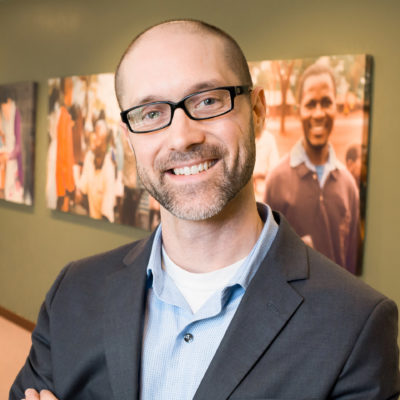
We All Want Students To Share Their Faith. Start Here
We want our students to be confident, bold, prepared and supported as they enter a hostile world—a darker world—a world more void of truth and of Jesus. This is precisely why the Awana Youth Ministry team partnered with Sean McDowell last year to create the most comprehensive youth apologetics curriculum to date. We were confident the Advocates study would dramatically change how students see and understand truth and the evidence for the Christian faith. But we were also confident the study could not end with mere intellectual assent. There had to be action to accompany their new knowledge.
So we created the natural sequel to Advocates. We created Witnesses, a Bible study designed to train students to share their faith with anyone and everyone. It is more than just a study or a vehicle to greater levels of personal spiritual growth. It is hands-on training.
We sought out some of the world’s greatest minds on the subject from Chicago to Uganda to learn as much as we possibly could on what it means to share our faith and how to train students to make evangelism a regular part of their Christian lives. In that journey we were continually confronted with four key reminders about what can often stand in our way of being effective witnesses of the gospel.
Understand complexity, explain with simplicity.
In the classroom, teachers know a student “gets it” when they explain something simply in their own words. But sometimes our efforts to simplify can be harmful when complexity is ignored or glossed over.
Let me explain.
On the one hand, the gospel message is incredibly simple. Simple enough that my four-year-old daughter can get the gist. However, the gospel is also incredibly thick with layer upon layer, giving it rich and deep meaning. Complex enough that a seminary professor could study the gospel and its implications for an entire career. In our efforts to avoid turning youth group into seminary, we err on the side of simplicity. But it is often not enough. While your treatment of the gospel need not be a Ph.D. dissertation, you do need to explore the complexity of God so students can explain the simplicity of God. For example, students need to dive into the depths of God’s love for humanity and the intricate problem of sin so they can effectively help someone see how the gospel addresses the human condition.
Avoid cramming a round peg in a square hole.
We teach how we learn. It’s easy to forget how others learn. It’s easy to ignore the vastly different wiring and chemistry of each student we are asked to minister to. So when we teach our students how to share their faith, it’s much easier to supply them with a cookie-cutter approach that we find helpful or useful. But to train students to take Jesus into their world for the sake of their world we have to get beyond formulas, cookie-cutters, and production line evangelism. Witnesses creates opportunities for the students to dive into who God has created them to be and to find ways to live out the gospel message according to their personalities, interests, gifts, and talents.
Students are different. So it would be natural to assume that the way they express the gospel and live their lives for Christ will differ as well. The extroverted athlete might lead team prayer, or actively find ways to be a witness on the field or court. While the introverted musician might work to connect people to the power of Christ’s love through music. Allow students to dial into how they are creative and use that to kindle a fire for sharing the gospel.
Expect rejection
No one likes rejection. But it is completely unavoidable. Whether a team tryout, a job, or even a potential prom date, rejection is simply part of the daily rhythm of life. As I grew in my faith, I could not wrap my mind around the idea of a person not wanting Jesus. However, I completely understood why I didn’t make the basketball team. Rejection on the court was obvious, but rejecting Jesus seemed unimaginable.
But it was in those moments I found myself returning time and again to what Paul told the Corinthian church. We all have our roles, but in the end, it is God who makes it all happen (1 Corinthians 3:7). Which in part, means that rejection is part of the process. Which also means that I am only responsible for my role. Whether or not a person accepts the free gift of grace does not rest on my shoulders. Making their rejection or dismissal of the gospel, much less about me and all about Christ. If I didn’t get the part in the school’s play, I might need to work on my acting skills. If I failed the test, I might need to study more. Not the case with the proclaiming the gospel.
Remind your students that rejecting Jesus does not necessarily mean they need more practice, or they failed, or even evangelism is not their gift (although doing our part does mean practice and preparation for those important spiritual conversations). Our job is to be faithful to the gospel and the mission. Leave the results to God.
Above all, love.
This may come as a shock, but most people don’t come to know Christ because the rock concert that was worship was epic, or because the speaker delivered the most profound blend of words your ears have ever been privileged to hear.
Nope.
A great worship experience is important. And a well-crafted, beautifully prepared sermon is powerful. But neither of those matter without love. People come to know Jesus because they encounter a profound explosion of love into their lives.
The crux of being a witness is to imitate God (Ephesians 5:1), by imitating love. How we love people far exceeds our programs. How we respond to hate and injustice in culture worships louder and more beautifully than any band.
Training your students to effectively share their faith starts here. It starts with laying our cards on the table and knowing exactly what we are working with and what we ought to expect in the process. But this is only the beginning. Take a minute and check out the rest of the study by visiting getwitnesses.org.
Steve Kozak
Executive Director of AwanaYM
Steve currently serves as the Executive Director of AwanaYM. Previously, Steve spent over a decade teaching high school theology and apologetics from Detroit to LA. Steve holds a Masters degree in Theology from Moody Theological Seminary and a Masters in Christian Apologetics from Biola University. Steve is also an adjunct professor at Trinity International University. He speaks and writes on youth ministry, youth culture and apologetics. He resides in Chicago, IL with his wife and four children.FollowSteve Kozak on Twitter: stevenmkozak
Comments
Get the AwanaYM Update
Receive youth ministry resources in your inbox. Subscribe today!
